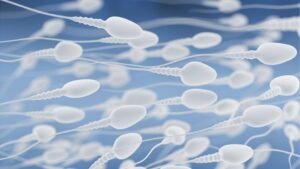Non Obstructive Azoospermia Treatment | No-Sperm Count
Do you have azoospermia and want to know about the best non obstructive azoospermia treatment? Through our cutting-edge therapies, some men with non-obstructive azoospermia may be able to have their eggs fertilised naturally, allowing them to become parents without the need of assisted reproductive technology (ART)
Despite the fact that numerous parts of the testicles are barren and our patients can not produce enough sperm to transmit via their reproductive tracts, we can detect pockets of sperm production in many other patients’ testicles.
Table of Contents
What is Azoospermia?
Male infertility is caused by azoospermia, which is pronounced as a-zoo-SPER-mee-ah. It occurs when a man’s ejaculate (semen) contains no detectable sperm.
Normally, the testicles in a man’s scrotum are responsible for the production of sperm. In the male reproductive system, sperm travel through the bloodstream and combine with fluid to make semen. The thick, white fluid that is expelled from the penis during ejaculation is known as semen.
The condition known as azoospermia is observed in five to ten percent of males who are tested for infertility. It is possible that the condition is present from birth or that it develops later in life.
Stanford Health Care is a world leader in the treatment of azoospermia and the extraction of sperm. We develop a highly individualised treatment strategy for each patient in order to assist them in regaining their fertility.
Types of Azoospermia
1). Obstructive Azoospermia
The term “obstructive azoospermia” refers to the condition in which sperm production is normal but the reproductive canal for both testicles is clogged. This signifies that there is no detectable amount of sperm that can go into the sperm. Some people may have a separate condition on either side of the scrotum under different circumstances.

2). Non-Obstructive Azoospermia
Sperm production is weak in this kind of azoospermia because it is not obstructed. It is impossible for males to create enough sperm for a measurable quantity to appear in their sperm.
Nonobstructive azoospermia is still a difficult condition to treat, but breakthroughs in medical technology, such as those made by our experts and others, have made it possible to assist restore sperm to the sperm in certain situations.
Causes of Non-Obstructive Azoospermia
Genetic Factors
Non-obstructive azoospermia can be caused by a number of hereditary reasons of male infertility. Y-chromosome microdeletions and karyotypic abnormalities are examples of this. Klinefelter Syndrome is the most frequent karyotypic aberration, and it arises when a man has an extra X chromosome. Up to 10% of non-obstructive azoospermia individuals will have identifiable genetic defects that result in reduced sperm production.
Non-obstructive Azoospermia Caused by Hormones
Pituitary hormones must stimulate the testicles in order for them to create sperm. Sperm production is impossible if these hormones are deficient or absent. Men who use or have used steroids may have influenced the hormones required for sperm production.

Toxins and Radiation
Toxic substances including heavy metals, chemotherapy, and radiation therapy can all reduce sperm production. For this reason, sperm banking is suggested prior to chemotherapy or radiation treatment.
Medications
Certain drugs might also have a detrimental impact on sperm production. Taking testosterone supplements, for example, can interfere with the natural operation of the reproductive system.
Varicoceles
Varicoceles, or bulging varicose veins in the scrotum, can also impair sperm production. Varicoceles result in blood pooling in the scrotum, which reduces sperm production.
Azoospermia Diagnosed

Non-obstructive Azoospermia Treatment
Through our cutting-edge therapies, some men with nonobstructive azoospermia may be able to have their eggs fertilised naturally, allowing them to become parents without the need of assisted reproductive technology (ART).
Despite the fact that numerous parts of the testicles are barren and our patients can not produce enough sperm to transmit via their reproductive tracts, we can detect pockets of sperm production in many other patients’ testicles.
Because of our years of experience and competence in sperm extraction, we have had such great results.
In order to provide you with treatment suggestions, your doctor will discuss your individual problem with you. Changing one’s lifestyle, switching one’s medicine, or starting to avoid certain toxic substances may be sufficient solutions for some guys.
In addition, if you have had chemotherapy or radiation therapy, your reproductive system is quite robust; your body just needs time to recuperate from the treatment.
However, we may also advocate a more direct course of action. In any event, you must let your body 2-3 months to produce enough sperm thereafter before you would see a significant difference.
Hormone treatment
Depending on their current hormone levels, some men with nonobstructive azoospermia may benefit from therapy with certain hormones, which may coax sperm back to their sperm or increase the chance of finding sperm during sperm extraction and retrieval. These hormones are as follows:
- Hormone that stimulates the formation of follicles (FSH)
- Human chorionic gonadotropin is a hormone that stimulates pregnancy (HCG)
- Clomiphene
- Anastrazole
- Letrazole

